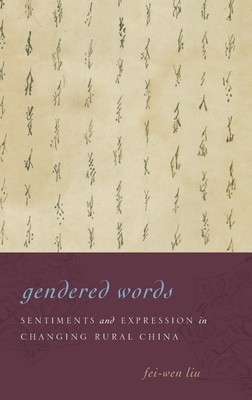
- We will send in 10–14 business days.
- Author: Fei-Wen Liu
- Publisher: Oxford University Press, USA
- ISBN-10: 0190210400
- ISBN-13: 9780190210403
- Format: 15.2 x 23.6 x 2.5 cm, hardcover
- Language: English
- SAVE -10% with code: EXTRA
Reviews
Description
Built on twenty years of fieldwork in rural Jiangyong of Hunan Province in south China, this book explores the world's only gender-defined and now disappearing "women's script" known as nüshu. What drove peasant women to create a script of their own and write, and how do those writings throw new light on how gender is addressed in epistemology and historiography and how the unprivileged social class uses marginalized forms of expression to negotiate with the dominant social structure. Further, how have the politics of salvaging this disappearing centuries-old cultural heritage molded a new poetics in contemporary society?
This book explores nüshu in conjunction with the local women's singing tradition (nüge), tied into the life narratives of four women born in the 1910s, 1930s, and 1960s respectively, each representative in her own way: a nüge singer (majority of Jiangyong women), a child bride (enjoying not much nüshu/nüge), the last living traditionally-trained nüshu writer, and a new-generation nüshu transmitter. Altogether, their stories unfold peasant women's lifeworlds and forefronts various aspects of China's changing social milieu over the past century. They show how nüshu/nüge-registering women's sense and sensibilities and providing agency to subjects who have been silenced by history-constitute a reflexive social field whereby women share life stories to expand the horizon of their personal worldviews and probe beneath the surface of their existence for new inspiration in their process of becoming. With the concept of "expressive depths," this book opens a new vista on how women expressthemselves through multiple forms that simultaneously echo and critique the mainstream social system and urges a rethinking of how forms of expression define and confine the voice carried. Examining the multiple efforts undertaken by scholars, local officials, and cultural entrepreneurs to revive nüshu which have ironically threatened to disfigure its true face, this book poses a question of whither nüshu? Should it be transformed, or has it reached a perfect end point from which to fade into history?
EXTRA 10 % discount with code: EXTRA
The promotion ends in 17d.02:16:44
The discount code is valid when purchasing from 10 €. Discounts do not stack.
- Author: Fei-Wen Liu
- Publisher: Oxford University Press, USA
- ISBN-10: 0190210400
- ISBN-13: 9780190210403
- Format: 15.2 x 23.6 x 2.5 cm, hardcover
- Language: English English
Built on twenty years of fieldwork in rural Jiangyong of Hunan Province in south China, this book explores the world's only gender-defined and now disappearing "women's script" known as nüshu. What drove peasant women to create a script of their own and write, and how do those writings throw new light on how gender is addressed in epistemology and historiography and how the unprivileged social class uses marginalized forms of expression to negotiate with the dominant social structure. Further, how have the politics of salvaging this disappearing centuries-old cultural heritage molded a new poetics in contemporary society?
This book explores nüshu in conjunction with the local women's singing tradition (nüge), tied into the life narratives of four women born in the 1910s, 1930s, and 1960s respectively, each representative in her own way: a nüge singer (majority of Jiangyong women), a child bride (enjoying not much nüshu/nüge), the last living traditionally-trained nüshu writer, and a new-generation nüshu transmitter. Altogether, their stories unfold peasant women's lifeworlds and forefronts various aspects of China's changing social milieu over the past century. They show how nüshu/nüge-registering women's sense and sensibilities and providing agency to subjects who have been silenced by history-constitute a reflexive social field whereby women share life stories to expand the horizon of their personal worldviews and probe beneath the surface of their existence for new inspiration in their process of becoming. With the concept of "expressive depths," this book opens a new vista on how women expressthemselves through multiple forms that simultaneously echo and critique the mainstream social system and urges a rethinking of how forms of expression define and confine the voice carried. Examining the multiple efforts undertaken by scholars, local officials, and cultural entrepreneurs to revive nüshu which have ironically threatened to disfigure its true face, this book poses a question of whither nüshu? Should it be transformed, or has it reached a perfect end point from which to fade into history?


Reviews